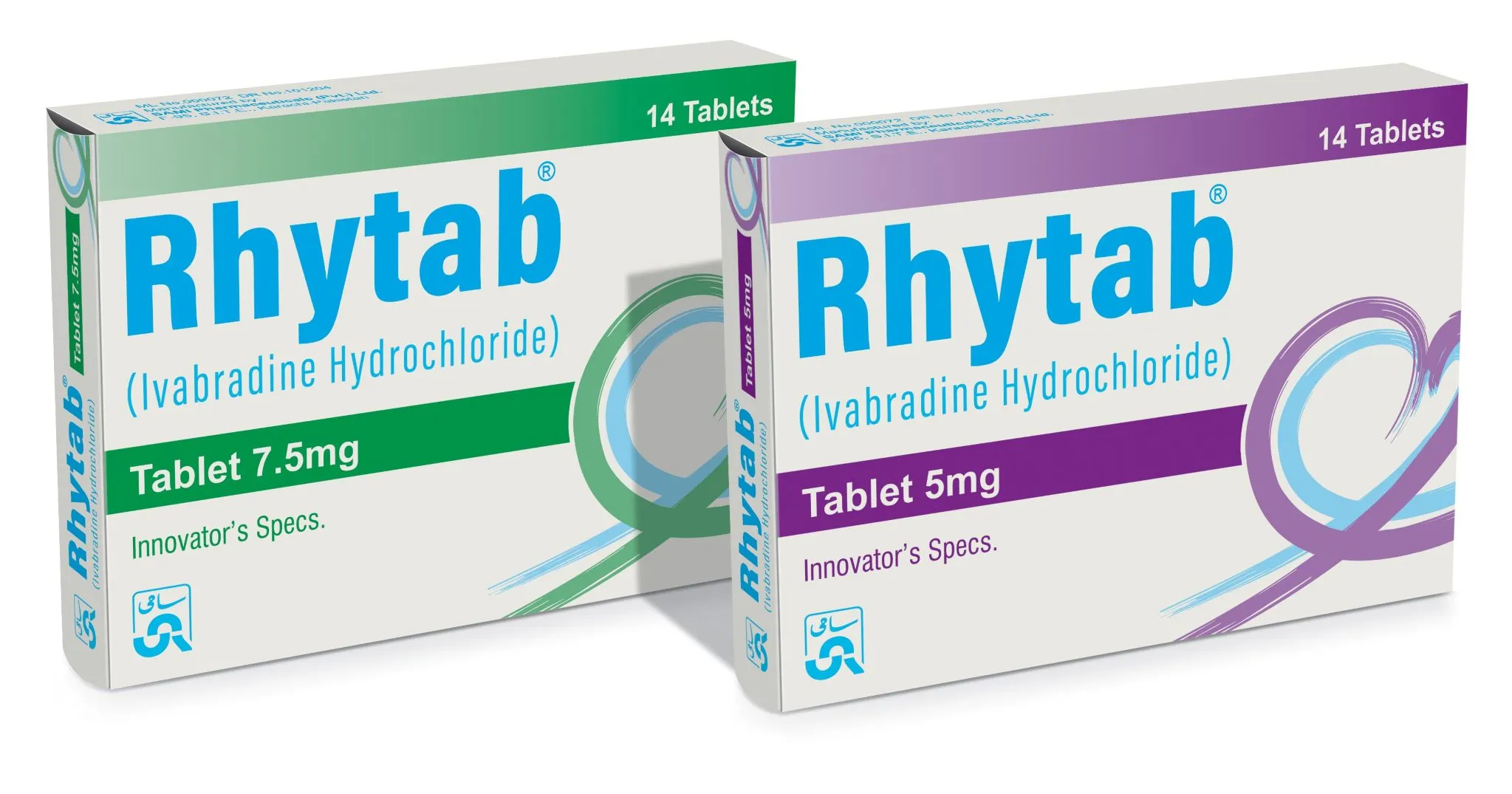Description
Generic Name: Ivabradine Hydrochloride
Brand Name: RHYTAB
Strength: 7.5mg per tablet
Form: Oral tablet
Pack Size: 14 tablets per pack
Pharmacological Class: If-channel inhibitor
Prescription Status: Prescription-only (Rx)
Overview:
RHYTAB 7.5mg Tablet contains Ivabradine Hydrochloride, a medication that selectively reduces the heart rate without affecting myocardial contractility or blood pressure. It is used primarily for patients with chronic heart failure (CHF) and stable angina (chest pain), offering an effective heart rate-lowering alternative when beta-blockers are either ineffective or not tolerated.
Ivabradine specifically targets the If current (funny current) in the sinoatrial node, which plays a key role in regulating the heart’s rhythm. By inhibiting this current, RHYTAB 7.5mg lowers the heart rate, thus improving the heart’s efficiency and reducing the oxygen demand during conditions like heart failure and angina.
Mechanism of Action:
Ivabradine selectively inhibits the If current in the sinoatrial node (the heart’s natural pacemaker). This current regulates the heart rate by controlling the slow depolarization of pacemaker cells. By reducing the If current, Ivabradine slows down the heart rate without affecting other parameters like blood pressure, heart contractility, or electrical conduction.
This mechanism is particularly beneficial for patients with heart failure and angina, where slowing the heart rate reduces the workload on the heart and improves myocardial oxygen efficiency. The heart’s need for oxygen is reduced, which in turn decreases the frequency and severity of angina episodes and helps manage heart failure symptoms.
Indications:
RHYTAB 7.5mg Tablet is indicated for the treatment of:
- Chronic Heart Failure (CHF):
- As an adjunct to standard heart failure therapy, including beta-blockers, to improve symptoms, reduce hospitalizations, and improve quality of life in patients with reduced ejection fraction.
- Stable Angina Pectoris:
- In patients with chronic stable angina who are inadequately controlled with conventional therapy or in those who cannot tolerate beta-blockers.
- Heart Rate Control:
- To control heart rate in patients requiring reduction of resting heart rate due to high risk or inappropriate response to other treatments.
Dosage and Administration:
- Typical Adult Dose for Angina:
- 7.5mg taken twice daily with food.
- Dose may be adjusted based on heart rate and patient response.
- Typical Adult Dose for Heart Failure:
- 7.5mg taken twice daily with food, adjusted to the patient’s heart rate and clinical response.
- Renal or Hepatic Impairment:
- Ivabradine should be used with caution in patients with severe renal or hepatic impairment, as dosage adjustments may be required.
Regular heart rate monitoring is necessary to avoid excessive bradycardia (slow heart rate). If the heart rate drops below 50 beats per minute, the dose should be reduced.
Side Effects:
Common:
- Bradycardia (slow heart rate)
- Visual disturbances (phosphenes or flashes of light)
- Headache
- Dizziness
- Fatigue
- Nausea
Less common but serious:
- Atrioventricular (AV) block
- Syncope (fainting)
- Severe bradycardia requiring dose adjustment
- Arrhythmias (irregular heartbeats)
Precautions:
- Bradycardia: Ivabradine reduces heart rate, so bradycardia must be monitored regularly. If the heart rate falls too low (below 50 bpm), the dose should be reduced.
- Pregnancy and Lactation: Ivabradine is not recommended during pregnancy or lactation unless absolutely necessary. It falls under Category C for pregnancy.
- Liver or Renal Disease: Use caution in patients with liver or kidney disorders, especially severe liver disease, as it may require dose adjustments.
- Visual Disturbances: Temporary visual phenomena like phosphenes (flashes of light) may occur, which typically resolve with continued use.
Drug Interactions:
- CYP3A4 Inhibitors (e.g., ketoconazole, ritonavir, clarithromycin): May increase the concentration of Ivabradine, increasing the risk of bradycardia.
- CYP3A4 Inducers (e.g., rifampin, phenytoin): May lower Ivabradine levels and reduce its effectiveness.
- Beta-blockers: Concomitant use may further slow the heart rate, requiring careful monitoring.
- Antiarrhythmic Drugs (e.g., amiodarone): May increase the risk of heart block or arrhythmias when used with Ivabradine.
Storage Instructions:
- Store at room temperature (15°C to 25°C).
- Keep in a dry place, away from moisture and light.
- Keep out of reach of children.
Packaging:
- Available in 14 tablets per pack, each tablet containing 7.5mg of Ivabradine Hydrochloride.
Key Benefits:
- Selective heart rate reduction without affecting myocardial contractility or blood pressure.
- Effective in managing chronic heart failure and stable angina when other treatments are inadequate or poorly tolerated.
- Once- or twice-daily dosing enhances patient compliance.
- Minimally invasive with manageable side effects for most patients.
- Improved quality of life by reducing symptoms and hospitalizations.



Reviews
There are no reviews yet.